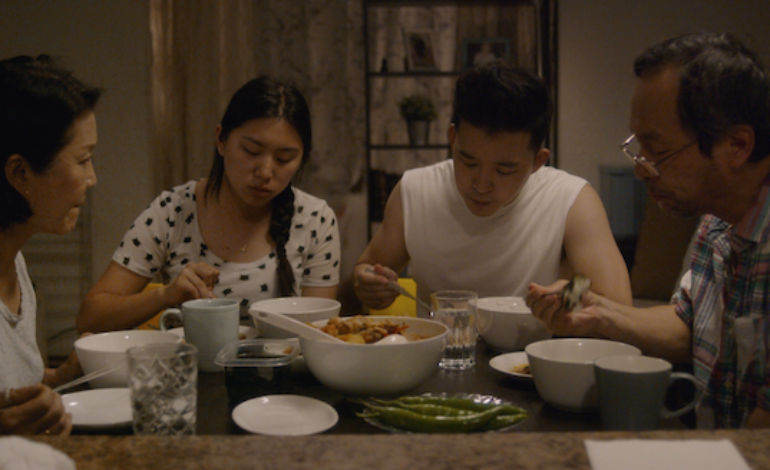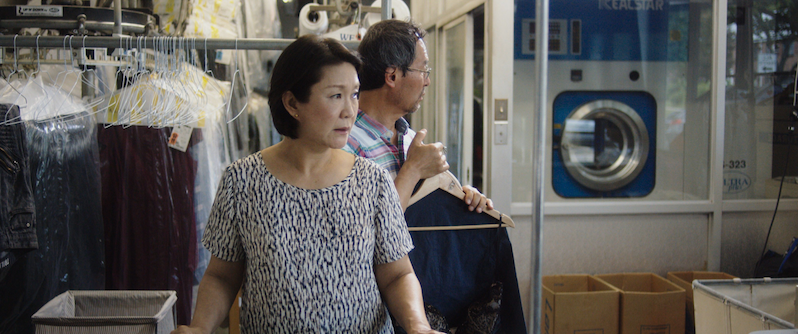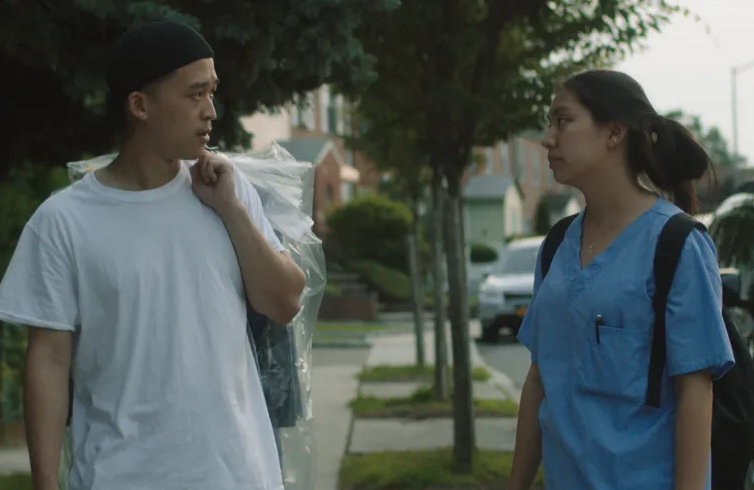

Happy Cleaners (2019) was directed by Julian Kim (Call Taxi, “Flushing Web Series”) and Peter S. Lee (“Flushing Web Series”) in their feature directorial debut, and written by Lee, Kim, and Kat Kim. Happy Cleaners sees immigrant parents (played by Charles Ryu and Hyang-hwa Lim) struggling to keep their dry cleaning business afloat in Flushing, New York with their hardworking daughter Hyunny (Yeena Sung) and college dropout son, Kevin (Yun Jeong) who both aspire to do things their parents disapprove of. However, when the Choi family eventually lose their dry cleaning business, they learn to love each other to survive the crisis and heartaches that they cause each other.
Where this film really excels is in its portrayal of a Korean-American family, the struggles the parents face as immigrants, and how their cultural values both clash with their children but also unite them. This film portrays the hardships that the family face, both with making ends meet and with each other, in a really raw and brutally honest way. Every single member of the family has a struggle that leads them to come at odds with each other and they evidently have to overcome. This also ties in with the way the films play into the disparity between American and Korean culture. The son, for example, dropped out of school so he can eventually move to LA to grow his food truck business. This causes him to come at odds with his mother, who is mad at him for dropping out of school. This ultimately leads a lot of the financial burden to fall on Hyunnny, who is not only still in school but also works part-time to contribute to the bills.


The writers do a great job of interweaving all these conflicts and having new ones emerge as the film progresses. Something really exceptional that the writer’s do to highlight the cultural disparity between the parents and children, especially Kevin, is that even when he is alone with his mother or father, he mostly speaks English, while his parents prefer to speak Korean. The same thing goes to the daughter, who does however speak a bit more Korean around her parents. The use of language overall was excellent in the film and helped to highlight the different relationships in a more unique way. You also see the family’s cultural disparities clash when an angry customer asks for a check. Kevin thinks that his parents should’ve stood up to the customer, but the mother understands that the law only sees them as immigrants and won’t take their side. There were a few really powerful scenes like that. Another one that comes to mind is when Hyunny and the mother are arguing about Danny and the dad overhears something the mother says about him. It was really heartbreaking.
This film is full of conflict, yes, but there’s also so much love in the film. Which leads me to the direction and cinematography. There are plenty of shots of food and people making food, especially with the family making food. It might seem relatively pointless from the way I describe it, but not only is the food beautifully shot (and look absolutely delicious), but I think that they do a great job of showing how important food is to this family and to their culture. I think those scenes are the best at showing how much the cinematography and direction come together to simply show this family’s life as well as what unites them. The cinematography overall from Gordon Yu was very effective and did a great job of telling the story. Whether it be the wide shots or some effective long takes, we really felt like we were watching this family live life. Credit also goes to Julian Kim and Peter S. Lee for this. I really like how they made it so the film doesn’t take one family member’s side over another. It makes us want to see them all come together and reach an understanding. Even the characters like the mother or Kevin, who are more stubborn and set in their ways and more often than not are at odds, we understand where they’re coming from and why they can’t always see eye to eye with others. So, when they do reach an understanding, it’s incredibly heartwarming.


While overall a great script, it did admittedly have a hard time sucking me in at the beginning. This was mostly due to the dialogue, which was rather exposition heavy. The scenes were also staged in a way where most of the focus was on what was being said. It just didn’t feel natural and took me out of the film for the first 15 minutes. I also thought that the new landlord was written I thought was extremely on the nose and borderline cartoonish. This was just a bit of a shame considering how well written the rest of the characters were. Likewise, once I got past those first 15 minutes, the film was extremely gripping.
The acting was a bit of a mixed bag, particularly from two of the actors. Both Yun Jeong (“I, Witness,” Call Taxi) as Kevin and especially Hyang-hwa Lim (The Arrival) as the mother I thought were excellent. Yeena Sung (“Untitled Gamer Comedy Show,” Let’s Play Dead Girl) as Hyunng overall had some really excellent standout scenes, but there were admittedly a few moments in which her performance felt a bit flat. Charles Ryu (Call Taxi, The Forty-Year-Old Version) had the opposite situation of Yeena Sung where they were a few moments of over-acting that felt a bit distracting, though he overall did a good job. Speaking of the father, I do think of all the characters, he admittedly was a bit overshadowed by the other three main characters, which was a bit disappointing. I think that there could have been a bit more development given to him, though there was a good arc between him and Kevin, I think it would’ve been nice to get to see a little bit more development with his and the mother’s relationship.
Verdict: 4 out of 5 Stars
Though the film falters a bit at the beginning and has a few weak moments of acting, Happy Cleaners (2019) was overall an extremely well-told depiction of a Korean-American family, as well as what it means to be children of Korean immigrants. It depicts four incredibly distinct but empathetic family members each trying to support each other while also becoming at odds with their own struggles and values in their day to day life. Julian Kim and Peter S. Lee have made a knockout feature debut that feels extremely personal, in addition to being beautifully shot and well written.
